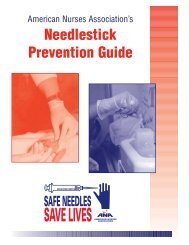Moral Courage in Action: Case Studies - American Nurses Association
Moral Courage in Action: Case Studies - American Nurses Association
Moral Courage in Action: Case Studies - American Nurses Association
Create successful ePaper yourself
Turn your PDF publications into a flip-book with our unique Google optimized e-Paper software.
Ethics, Law,<br />
and Policy<br />
Vicki D. Lachman<br />
<strong>Moral</strong> <strong>Courage</strong> <strong>in</strong> <strong>Action</strong>: <strong>Case</strong> <strong>Studies</strong><br />
In the April 2007 issue, I discussed the importance of<br />
moral courage <strong>in</strong> resolv<strong>in</strong>g difficult ethical problems<br />
(Lachman, 2007a). <strong>Moral</strong> courage is the <strong>in</strong>dividual’s<br />
capacity to overcome fear and stand up for his or her<br />
core values and ethical obligations (Lachman, 2007b). It<br />
is the will<strong>in</strong>gness to address a problem that others are<br />
ignor<strong>in</strong>g or sidestepp<strong>in</strong>g. Cl<strong>in</strong>ical practice offers a multitude<br />
of opportunities to speak out and advocate for<br />
patients, families, new graduates, and the preservation<br />
of quality care <strong>in</strong> your unit.<br />
As promised, <strong>in</strong> this column four different case studies<br />
relevant to the practice of a medical-surgical nurse<br />
are analyzed. The first case study focuses on the need<br />
for moral courage <strong>in</strong> the dy<strong>in</strong>g patient, where the right<br />
action is support<strong>in</strong>g the patient’s expressed wishes. The<br />
second case study will center on the management of a<br />
disruptive family. <strong>Case</strong> three will emphasize the ongo<strong>in</strong>g<br />
ethical issues of <strong>in</strong>civility/bully<strong>in</strong>g toward new nurses.<br />
The fourth and f<strong>in</strong>al case will spotlight the nurse’s ethical<br />
responsibilities when the new nurse manager is<br />
asked to do someth<strong>in</strong>g unethical. Each example will provide<br />
an overview of an actual case, disguised to protect<br />
the <strong>in</strong>dividual or organization. It will conta<strong>in</strong> the basic<br />
description of the case, highlight the ethical issues, and<br />
describe the obvious need for moral courage and<br />
options for an ethical solution.<br />
<strong>Moral</strong> <strong>Courage</strong> with a Dy<strong>in</strong>g Patient<br />
Mr. T. is an 82-year-old widower who has been a<br />
patient on your unit several times over the past 5 years.<br />
His CHF, COPD, and diabetes have taken a toll on his<br />
body. He now needs oxygen 24 hours a day and still has<br />
dyspnea and tachycardia at rest. On admission, his ejection<br />
fraction is less than 20%, EKG shows a QRS <strong>in</strong>terval<br />
of greater than 0.13 seconds, and his functional class is<br />
IV on NYHA assessment. He has rema<strong>in</strong>ed symptomatic<br />
despite maximum medical management with a vasodilator<br />
and diuretics. He tells you, “This is my last trip; I am<br />
glad I have made peace with my family and God. Nurse,<br />
I am ready to die.” You ask about an advance directive<br />
and he tells you his son knows that he wants no heroics,<br />
but they just have never gotten around to fill<strong>in</strong>g out the<br />
form. When the son arrives, you suggest that he speak<br />
with the social worker to complete the advance directive<br />
and he agrees reluctantly. You page the physician to discuss<br />
DNR status with the son. Unfortunately, Mr. T. expe-<br />
Vicki D. Lachman, PhD, APRN, MBE, is an Associate<br />
Professor, Drexel University, Philadelphia, PA.<br />
riences cardiac arrest before the discussion occurs and<br />
you watch helplessly as members of the Code Blue Team<br />
perform resuscitation. Mr. T. is now on a ventilator and<br />
the son has dissolved <strong>in</strong>to tears with cries of, “Do not let<br />
him die!” What is the action the nurse needs to take?<br />
It is the ethical obligation of this nurse to support<br />
the self-determ<strong>in</strong>ation of this patient. This patient had<br />
capacity when he voiced “no heroics” and the expectation<br />
that his son, as his surrogate decision maker, would<br />
honor his expressed wishes. Mr. T. met the criteria for<br />
hospice referral prior to hospitalization, but even more<br />
so now that he has a history of cardiac arrest (National<br />
Hospice Organization, 1996). The attend<strong>in</strong>g physician is<br />
not discuss<strong>in</strong>g the facts of the case with the son and has<br />
never brought up the topic of hospice. The Code for<br />
Ethics for <strong>Nurses</strong> (the Code) (<strong>American</strong> <strong>Nurses</strong><br />
<strong>Association</strong> [ANA], 2001, p. 9.) provides the follow<strong>in</strong>g<br />
guidance for the nurse:<br />
The nurse supports the patient self-determ<strong>in</strong>ation<br />
by participat<strong>in</strong>g <strong>in</strong> discussions with surrogates, provid<strong>in</strong>g<br />
guidance and referral to other resources as<br />
necessary, and identify<strong>in</strong>g and address<strong>in</strong>g problems<br />
<strong>in</strong> decision-mak<strong>in</strong>g process.<br />
The nurse knows the son will need help <strong>in</strong> lett<strong>in</strong>g go<br />
of his father and asks if he would like her to call his sister<br />
and pastor. The nurse also musters the courage to<br />
start a conversation with the physician and discovers<br />
that Mr. T. has been his patient for 20 years. Though both<br />
physician and son <strong>in</strong>itially are defensive, the nurse’s<br />
assertiveness and perseverance get results. Mr. T. is<br />
removed from the ventilator 24 hours later. He dies<br />
peacefully <strong>in</strong> the presence of his family and physician.<br />
<strong>Moral</strong> <strong>Courage</strong> with a Family Disruption<br />
Tom has been a cl<strong>in</strong>ical nurse on the unit for 3 years<br />
and tonight is charge nurse for a fully occupied 30-bed<br />
unit. Even though two staff members called <strong>in</strong> sick, the<br />
supervisor was able to pull a RN and a nurse’s aid from<br />
another unit. In shift report, Tom had heard aga<strong>in</strong> <strong>in</strong><br />
detail about the Host family. This family has been problematic<br />
for the last week, and the staff has compla<strong>in</strong>ed<br />
constantly about their cont<strong>in</strong>uous, frequent requests;<br />
rudeness; and unwill<strong>in</strong>gness to leave the room when the<br />
patient <strong>in</strong> the other bed requests privacy.<br />
The 79-year-old patient <strong>in</strong> the Host family has COPD<br />
and mild dementia, and currently is hospitalized<br />
because of diagnosis of cerebrovascular accident (CVA).<br />
The CVA has left her with partial paralysis of the left side<br />
and <strong>in</strong>ability to speak. The family expects the nurses to<br />
MEDSURG Nurs<strong>in</strong>g—August 2007—Vol. 16/No. 4 275
do everyth<strong>in</strong>g for the patient, even though the patient is<br />
able and will<strong>in</strong>g to do a number of basic care functions.<br />
The crisis occurs when the son comes to the nurses’<br />
station, scream<strong>in</strong>g at the unit secretary about the staff’s<br />
<strong>in</strong>competence and demand<strong>in</strong>g to see the nurs<strong>in</strong>g supervisor.<br />
The charge nurse is <strong>in</strong> the nurses’ station and is<br />
able to address the hostile situation. What actions<br />
should the charge nurse take?<br />
The ethical obligation <strong>in</strong> this situation is to ma<strong>in</strong>ta<strong>in</strong><br />
an environment that preserves the <strong>in</strong>tegrity of all concerned,<br />
<strong>in</strong>clud<strong>in</strong>g the family. Tom also is obligated to<br />
safeguard the privacy of the other patient <strong>in</strong> Mrs. Host’s<br />
room. The Code (ANA, 2001, p. 19) provides the follow<strong>in</strong>g<br />
guidance for the nurse:<br />
Threats to <strong>in</strong>tegrity may <strong>in</strong>clude…verbal abuse from<br />
patients and coworkers....<strong>Nurses</strong> have a duty to<br />
rema<strong>in</strong> consistent with both personal and professional<br />
values and to accept compromise only to the<br />
degree that it rema<strong>in</strong>s an <strong>in</strong>tegrity-preserv<strong>in</strong>g compromise.<br />
An <strong>in</strong>tegrity-preserv<strong>in</strong>g compromise does<br />
not jeopardize the dignity or well-be<strong>in</strong>g of nurse or<br />
others.<br />
The charge nurse has the ethical and adm<strong>in</strong>istrative<br />
obligation to preserve the <strong>in</strong>tegrity of all concerned. This<br />
will require courage, calmness, and skills <strong>in</strong> conflict resolution.<br />
Too often nurses feel helpless and then quickly call<br />
security personnel, rather than recogniz<strong>in</strong>g that listen<strong>in</strong>g<br />
and mediation might be a better approach. Call<strong>in</strong>g security<br />
staff, or even the house supervisor, is likely to escalate<br />
this conflict. Because this family has been “disruptive”<br />
for a week, it is important to recognize that the<br />
problem has not been resolved for either nurs<strong>in</strong>g staff or<br />
family members. If the charge nurse is not able to deescalate<br />
the situation, then a patient relations representative<br />
might be useful to facilitate a family meet<strong>in</strong>g. As <strong>in</strong><br />
the situation with the dy<strong>in</strong>g patient, the nurse needs to<br />
look for all resources necessary to resolve the problem.<br />
<strong>Moral</strong> <strong>Courage</strong> to Confront Bully<strong>in</strong>g<br />
Melissa started on the unit as a new graduate 5<br />
weeks ago. She is still <strong>in</strong> orientation and has a good relationship<br />
with her preceptor. The preceptor has been<br />
assigned consistently to Melissa for most of the last 4<br />
weeks, but due to family emergency has not been available<br />
<strong>in</strong> the last week. Melissa has been told that she will<br />
be precepted by a different nurse for the rema<strong>in</strong>der of<br />
her orientation. The new preceptor has not been welcom<strong>in</strong>g,<br />
supportive, or focused on the educational goals<br />
of the orientation. In fact, this new preceptor has voiced<br />
to all who will listen her feel<strong>in</strong>gs about the <strong>in</strong>competence<br />
of new BSN graduates.<br />
The crisis occurs when Melissa fails to recognize a<br />
patient’s confusion as a result of an adverse medication<br />
effect. The preceptor berates Melissa <strong>in</strong> the nurses’ station,<br />
makes sarcastic comments <strong>in</strong> shift report about<br />
“<strong>in</strong>ability of university-educated nurses to recognize the<br />
basics,” and <strong>in</strong>forms the nurse manager “that new graduates<br />
are a danger to patients.”<br />
Melissa tells you that she th<strong>in</strong>ks she should resign<br />
and that maybe her previous preceptor was too easy on<br />
her. You know her preceptor is an excellent cl<strong>in</strong>ician and<br />
experienced teacher. What is your advice to Melissa?<br />
The ethical obligation to support colleagues is outl<strong>in</strong>ed<br />
<strong>in</strong> a section of the Code (ANA, 2001, p. 9) below:<br />
The pr<strong>in</strong>ciple of respect for persons extends to all<br />
<strong>in</strong>dividuals with whom the nurse <strong>in</strong>teracts. The<br />
nurse ma<strong>in</strong>ta<strong>in</strong>s compassionate and car<strong>in</strong>g relationships<br />
with colleagues and others with a commitment<br />
to the fair treatment of <strong>in</strong>dividuals....The standard<br />
of conduct precludes...any form of harassment<br />
or threaten<strong>in</strong>g behavior, or disregard for the effect of<br />
one’s behavior on others.<br />
Although workplace verbal abuse has many<br />
sources, it is most stressful when a co-worker is the perpetrator<br />
(Center for <strong>American</strong> <strong>Nurses</strong>, 2007). The nurse<br />
who is bully<strong>in</strong>g <strong>in</strong> this situation is us<strong>in</strong>g the power imbalance<br />
of be<strong>in</strong>g a senior nurse. The victim of bully<strong>in</strong>g is<br />
emotionally affected, result<strong>in</strong>g <strong>in</strong> an <strong>in</strong>ability to use normal<br />
problem solv<strong>in</strong>g as a cop<strong>in</strong>g strategy. Unless someth<strong>in</strong>g<br />
is done, Melissa’s self-confidence and psychological<br />
well-be<strong>in</strong>g will be eroded. By discuss<strong>in</strong>g this abuse<br />
with you, she is less isolated, but your assistance also<br />
needs to <strong>in</strong>clude how to approach the perpetrator.<br />
To support her act<strong>in</strong>g courageously, the guidance to<br />
Melissa should <strong>in</strong>clude the follow<strong>in</strong>g:<br />
1. Prepare what she will say the next time she is criticized<br />
by the preceptor.<br />
2. Include <strong>in</strong> the statement that the behavior is unacceptable<br />
and harmful: “When you criticize me <strong>in</strong><br />
front of people, I feel degraded because your comments<br />
are not meant to help me constructively be a<br />
better nurse. I would like you to focus your feedback<br />
on how I can change behaviors to be a great nurse.”<br />
3. If the confrontation does not work, then she must go<br />
to the manager.<br />
Role play<strong>in</strong>g with her a few times also would be supportive.<br />
What is important is that the nurse speak up;<br />
otherwise the abuse will cont<strong>in</strong>ue.<br />
<strong>Moral</strong> <strong>Courage</strong> to Confront Unethical Behavior In<br />
Management<br />
Sarah was promoted to nurse manager because of<br />
her excellence <strong>in</strong> deliver<strong>in</strong>g patient care and recognized<br />
leadership ability. She was a preceptor, excellent charge<br />
nurse, outstand<strong>in</strong>g patient advocate, and chair of the<br />
practice council. Sarah has been a medical-surgical<br />
nurse for over 10 years and loves the variety of patients<br />
under her care. She only recently completed her BSN<br />
degree and earned her certification <strong>in</strong> medical-surgical<br />
nurs<strong>in</strong>g.<br />
When Sarah was <strong>in</strong> her position for less than 3<br />
months, her immediate supervisor moved to another<br />
state because of his wife’s promotion. This <strong>in</strong>dividual<br />
had been a mentor, confidant, and recognized leader <strong>in</strong><br />
the organization. Sarah tried to make the best of the situation<br />
and follow the direction of her new supervisor.<br />
However, right from the beg<strong>in</strong>n<strong>in</strong>g, she found this <strong>in</strong>dividual<br />
to be very focused on the negative. As an optimistic<br />
person, Sarah found this approach counter to her<br />
basic <strong>in</strong>st<strong>in</strong>cts about people.<br />
Every time she tried to discuss this difference <strong>in</strong><br />
approach, her director would say she was naive and that<br />
the staff was tak<strong>in</strong>g advantage of her good nature. The<br />
director used several of her recent project failures to justify<br />
her position. However, Sarah understood that these<br />
276 MEDSURG Nurs<strong>in</strong>g—August 2007—Vol. 16/No. 4
disappo<strong>in</strong>tments had been the result of staff illness and<br />
<strong>in</strong>stitutional reorganization.<br />
The crisis po<strong>in</strong>t was reached when the director told<br />
her to get rid of two staff members who were the most<br />
vocal <strong>in</strong> their dissatisfaction with the reorganization.<br />
These <strong>in</strong>dividuals are excellent cl<strong>in</strong>ical nurses, well-liked<br />
by staff, and each has over 12 years of seniority <strong>in</strong> the<br />
organization. Sarah knew that the director did not like<br />
these nurses for reasons unrelated to reorganization and<br />
their performance. After her third sleepless night, she<br />
comes to you to ask for guidance. What advice do you<br />
give?<br />
Your ethical obligation is aga<strong>in</strong> to support the<br />
<strong>in</strong>tegrity of the nurse, remember<strong>in</strong>g, “An <strong>in</strong>tegrity preserv<strong>in</strong>g<br />
compromise does not jeopardize the dignity or<br />
well-be<strong>in</strong>g of nurse or others” (ANA, 2001, p. 19). The<br />
nurse manager has a responsibility to establish, ma<strong>in</strong>ta<strong>in</strong>,<br />
and promote conditions of employment that support<br />
professional practice and the Code (ANA, 2001).<br />
<strong>Nurses</strong> are placed repeatedly <strong>in</strong> circumstances of conflict<br />
aris<strong>in</strong>g from compet<strong>in</strong>g loyalties <strong>in</strong> the workplace.<br />
This is why the Code (ANA, 2001, p. 20) discusses the<br />
concept of conscientious objection.<br />
Where nurses are placed <strong>in</strong> situations of compromise<br />
that exceed acceptable moral limits or <strong>in</strong>volve violations<br />
of the moral standards of the profession,<br />
whether it be <strong>in</strong> direct patient care or <strong>in</strong> any other<br />
forms of nurs<strong>in</strong>g practice, they may express their<br />
conscientious objection to participation.<br />
Sarah is obligated to take this issue to the appropriate<br />
person because fir<strong>in</strong>g people for prejudicial reasons<br />
is unethical. It will take courage for her to say “no” to her<br />
supervisor and possibly even more courage to voice her<br />
concerns to the chief nurs<strong>in</strong>g officer. However, she has a<br />
professional responsibility to ma<strong>in</strong>ta<strong>in</strong> her <strong>in</strong>tegrity, tell<br />
the truth, and resolve issues that threaten a moral practice<br />
environment.<br />
Conclusion<br />
Act<strong>in</strong>g morally requires knowledge of professional<br />
ethical obligations and the courage to confront the problem<br />
assertively. In all four of these scenarios, the nurse<br />
reaches a po<strong>in</strong>t of choice. The challenge <strong>in</strong> our fast<br />
paced medical-surgical environment is to do the right<br />
th<strong>in</strong>g, even when it takes more time and when it is frighten<strong>in</strong>g<br />
to speak out. ■<br />
References<br />
<strong>American</strong> <strong>Nurses</strong> <strong>Association</strong> (ANA). (2001). Code for ethics for nurses<br />
with <strong>in</strong>terpretative statements. Silver Spr<strong>in</strong>g, MD: <strong>American</strong> <strong>Nurses</strong><br />
Publish<strong>in</strong>g.<br />
Center for <strong>American</strong> <strong>Nurses</strong>. (2007). Bully<strong>in</strong>g <strong>in</strong> the workplace: Revers<strong>in</strong>g<br />
the culture. Silver Spr<strong>in</strong>g, MD: Author.<br />
Lachman, V. (2007a). <strong>Moral</strong> courage: A virtue <strong>in</strong> need of development?<br />
MEDSURG Nurs<strong>in</strong>g, 16(2), 131-133.<br />
Lachman, V. (2007b). Nurs<strong>in</strong>g matters – <strong>Moral</strong> courage: A cl<strong>in</strong>ical case<br />
example. ASBH Exchange Newsletter, 10(2), 8, 12.<br />
National Hospice Organization Standards and Accreditation Committee<br />
Medical Guidel<strong>in</strong>es Task Force. (1996). Medical guidel<strong>in</strong>es for determ<strong>in</strong><strong>in</strong>g<br />
prognosis <strong>in</strong> selected non-cancer diseases. Hospital Journal,<br />
11, 47-63.<br />
MEDSURG Nurs<strong>in</strong>g—August 2007—Vol. 16/No. 4 277


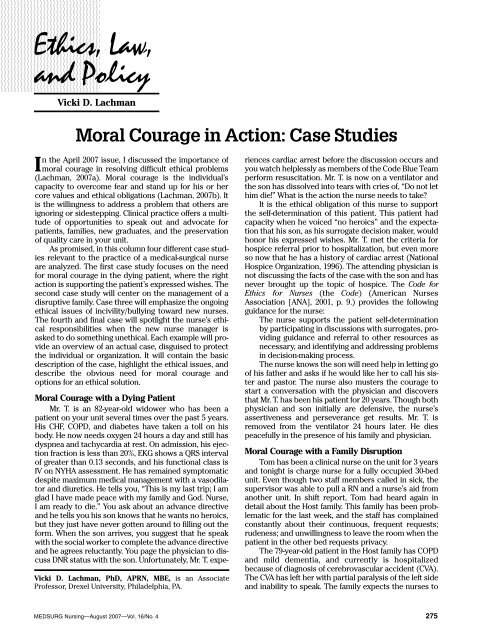
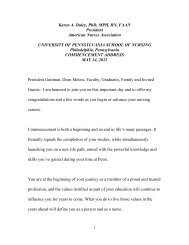
![National Partnership Priorities [PDF] - American Nurses Association](https://img.yumpu.com/50067378/1/190x245/national-partnership-priorities-pdf-american-nurses-association.jpg?quality=85)
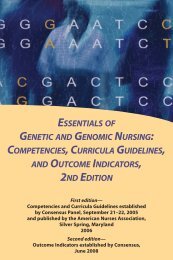
![Safety Issues Related to Tubing and Catheter Misconnections [pdf]](https://img.yumpu.com/49621668/1/190x245/safety-issues-related-to-tubing-and-catheter-misconnections-pdf.jpg?quality=85)
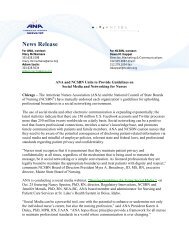
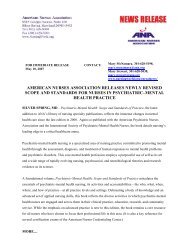
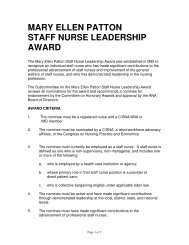
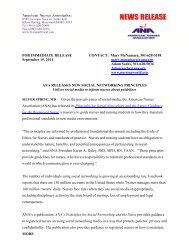
![Luther Christman Award Criteria [PDF] - American Nurses Association](https://img.yumpu.com/43348435/1/190x245/luther-christman-award-criteria-pdf-american-nurses-association.jpg?quality=85)
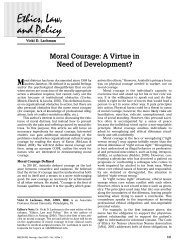
![JHNEBP Non-Research Evidence Appraisal [pdf]](https://img.yumpu.com/42642353/1/190x245/jhnebp-non-research-evidence-appraisal-pdf.jpg?quality=85)
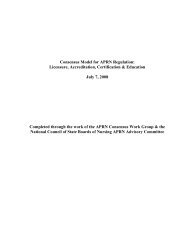
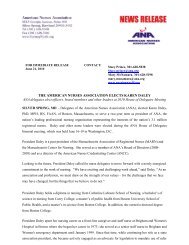
![Jessie M. Scott Award Criteria [PDF] - American Nurses Association](https://img.yumpu.com/36559235/1/190x245/jessie-m-scott-award-criteria-pdf-american-nurses-association.jpg?quality=85)
